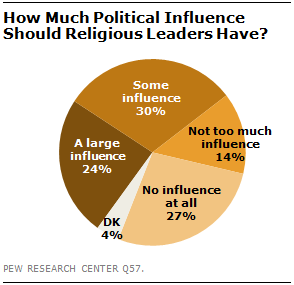Despite broad disappointment with the state of their nation and the ruling Islamist party, Ennahda, most Tunisians continue to welcome a role for Islam in politics. A majority (59%) thinks their laws should follow the values and principles of Islam. Another 29% say laws should strictly follow the Quran, while just 11% say Islam should have no influence on their country’s politics. Opinion today is very similar to what it was in 2012, although the percentage of Tunisians who want their laws to strictly follow the Quran has gone up slightly from 23% to 29%.
Majorities across all demographic groups say their country’s laws should follow the principles of Islam, rather than strictly follow the Quran or ignore the Quran altogether. Nonetheless, religiously-devout Muslims, defined as those who pray five times a day, are more likely than those who pray less often to say that their laws should strictly follow the Quran (33% vs. 21%).

On balance, Tunisians also prefer religious leaders to play a role in political matters. More than half (54%) say religious leaders should have at least some influence on politics, though only 24% say their impact should be large. About four-in-ten (41%) say religious leaders should not have a political role, including 27% who think they should have no influence at all.




